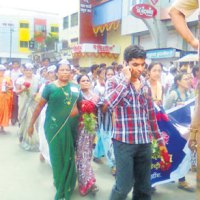That wouldn’t mean much if the agency investigating the case hadn’t done its best to prevent this coming out. The conduct of the ATS has been strange indeed. First, it kept on citing the need to go through these call records to get police custody of the accused. But its charge sheet made no mention of the records. Yet, when the accused wanted to have a look at them, the ATS refused, citing a variety of reasons. It was only when the high court dug its heels in on the issue that the prosecution threw in the towel, saying the accused could get the records from the mobile companies, since it had deleted the copies in its possession. No wonder cops hate judges and lawyers!
The mobile companies were also reluctant, first saying it would take months, then asking for Rs34 lakh as costs. Again it was left to the court to put its foot down.
The records corroborate what the three alleged bombers have been saying about where they were when the bombs were placed on the trains. They also seriously dent the credibility of the investigation — for the fourth time since the blasts.
Soon after the blasts, the ATS had gone on an arresting spree, describing every arrest as a “major breakthrough’’, and the man arrested as the “mastermind’’. But within three months, it applied for discharge of three such “masterminds’’, saying they had nothing to do with the blasts.
From Day One, the ATS had blamed Pakistan. But when it came to confronting Pakistan with the evidence, it played coy.
The real shocker came in the charge sheet — not a word about pressure cookers, after describing to a salivating media how the bombs had been assembled in pressure cookers, their make, from where they had been bought…
But even this wasn’t as shocking as the sudden emergence of an alternate narrative two years after the blasts. At a specially convened press conference, the then crime branch chief Rakesh Maria announced that the culprits were another set of boys belonging to the Indian Mujahideen; its co-founder Sadiq Shaikh, had himself confessed to this. The bombs weren’t assembled in a hut in Govandi as the ATS alleged, but in a Sewri flat.
But the ATS, then headed by KP Raghuvanshi, stuck to its story, and three months after his “confession’’, Sadiq Shaikh was discharged from this case at the behest of the ATS itself. Earlier this month, he told the court that the crime branch had tortured him to “confess’’ to the train blasts.
Allegations of torture have dogged this case right from the start, and no less than the PMO had to intervene. Family members of those arrested as well as those wanted, filed affidavits describing their alleged torture at the hands of the ATS, and were taken to meet the PM by Samajwadi Party chief Abu Asim Azmi.
209 innocents died in the serial train blasts. What must their families be thinking every time the investigating agency comes out looking foolish in these last seven years?
The author is a Mumbai-based freelance journalist.

Related articles
- Mumbai Train Blast -Wife of blast accused demands relief #mentaltroture #harassment (kractivist.wordpress.com)
- India – That shrinking space for dissent #Protest (kabirkalamanch.wordpress.com)
- 7/11 Mumbai blasts: Accused to examine IM co-founder (ibnlive.in.com)










